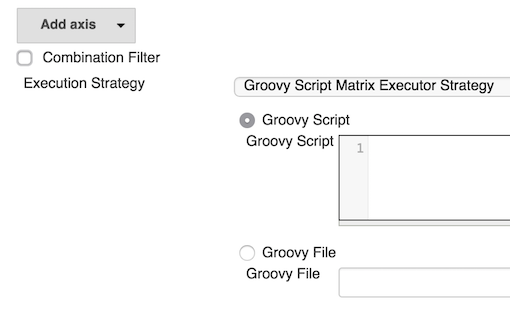A plugin to decide the execution order and valid combinations of matrix projects.This uses a user defined groovy script to arrange the order which will then be executed
Usage
This plugin makes use of an extension point in the matrix-project plugin
to allow for other execution strategies for matrix projects. When
installed, matrix projects will show a new drop-down to select an
execution strategy. Without the plugin, the default (or classic)
strategy is selected and not even displayed.

This plugin can also be used as a combination filter/touchstone to feed builds into the queue with more flexibility than the two stages supplied as standard.
Return Value
New for release 1.0.6. You can now specify if you want to continue after a failure. If you return a List with two items in it, the second item can be a true|false value where true will continue execution even after a failure. The idea is that you can control whether to continue after a failure from within the script
return [result, true]
The original functionality also works and will work as before
return result
will fail at the end of the current run as before.
Bindings
There are several variables available in the script
- combinations
- workspace
- jenkins
- execution
- result
- parameters
- env
- out
combinations
This is a List of a String map of all the matrix combinations
For example
[
{ axis1: "a", axis2: "x" },
{ axis1: "a", axis2: "y" },
{ axis1: "a", axis2: "z" },
{ axis1: "b", axis2: "x" },
{ axis1: "b", axis2: "y" },
{ axis1: "b", axis2: "z" }
]
workspace
A string of the workspace directory
jenkins
The Jenkins instance
execution
The is the [OneOffExecutor]( http://javadoc.jenkins-ci.org/hudson/model/OneOffExecutor.html) running the setup for the matrix job
result
The script is expected to return a [TreeMap](http://groovy.codehaus.org/JN1035-Maps). This is passed in for use but does not have to be the one returned
{
x: [
{ axis1: "a", axis2: "x" },
{ axis1: "b", axis2: "x" }
],
y: [
{ axis1: "a", axis2: "y" },
{ axis1: "b", axis2: "y" }
]
}
Notice that axis2: 'z' has not been returned, so these combinations will not be executed.
The results will be placed onto the build queue in the order they are placed in the array, so in the above it will be ['a','x'] then ['b','x']. When they are completed then ['a','y'] and ['b','y']. The combinations can run in a different order if there are dependencies on nodes, for example. This is a good way to feed your combinations in a definite order.
parameters
This is a hash of any build parameters used, with the parameter name as the key
env
This is the environment variables used in the build. It is also aware of the envinject plugin and will use these if installed and defined for the project
out
This is bound to the output logger for the build and its main use is to allow println statements to appear in the build log. This will happen transparently for
println 'something for the log'
Execution
The entries in the TreeMap returned will be executed in sequence.
That is to say, the first list will be executed in parallel, then the
second, and so on
A failure will stop the build on the next entry but the runs in flight
will not be stopped.
If no script is specified, all combinations will be run in parallel in
one go.
These will be run in alphabetical order of the keys.
Scripts
Location
The script can be in three locations
- Added in directly
- An absolute path available to the node running the job setting up the matrix (can be disabled in global config). This file is to exist on the master, even if running on a slave node.
- A relative path in the workspace (can be disabled in global config)
Example
How to transform the example above
combinations.each{
if(it.axis2 == 'z')
return
result[it.axis2] = result[it.axis2] ?: []
result[it.axis2] << it
}
[result, true]
Global Configuration
There is an option to disable scripts off the filesystem. This is useful if you want to secure scripts for non admin users. This option will change the job display section to only show a script option.
Release History
1.07
Fixed usage of script when using a fully qualified path. This script will reside on the master issue 15
1.06 (1.05 not released)
Added return list option to specify if a failure should continue the main build
return [ result, true]
Upgraded to use groovy 3.2.1
1.04
Added parameters binding
Added env binding
Added out binding
Try out all the above with this in your script
println '---------parameters--------'
parameters.each{ k,v ->
println "${k}-->${v}"
}
println '-------------env--------------'
env.each{ k,v ->
println "${k}-->${v}"
}
println '--------------------------------'
1.0.3
Bugfix to use a safer randomize method
1.0.2
Fixed to work with Matrix Build Listeners like Matrix Combination parameter
Added Script Security capability
Added global config option to disable using scripts off the filesystem - to complete script security
Please ask questions on github as I don't get notifications for this page